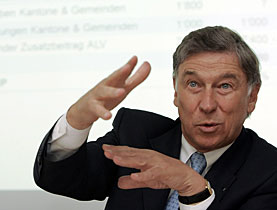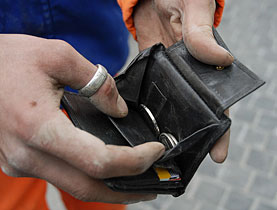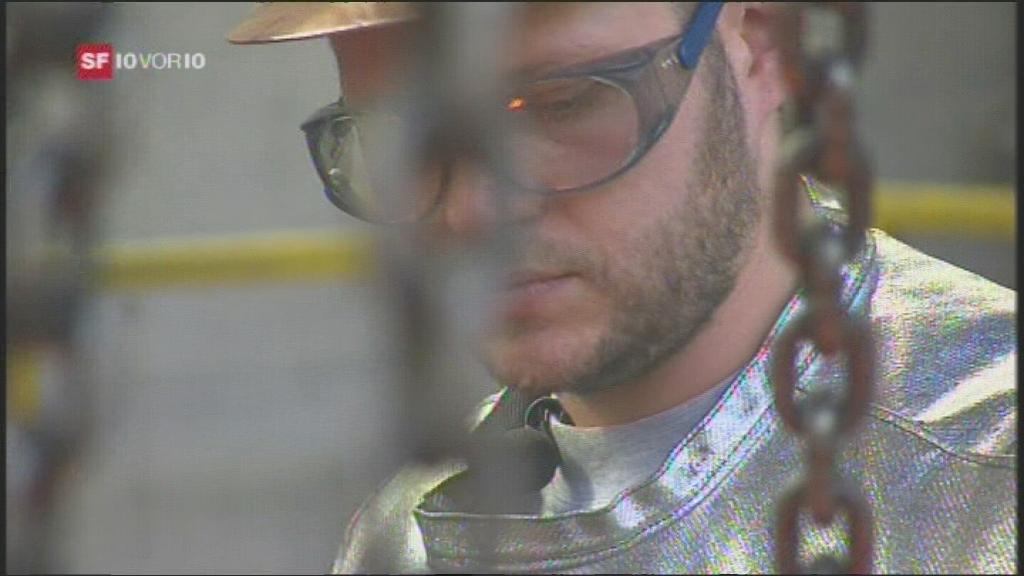Stimulus package worries business lobby group

A third wave of federal economic stimulus funds could prove counterproductive and perpetuate the cycle of boom and bust, the Swiss Business Federation has warned.
The government will decide next week whether to pump more spending into the Swiss economy to fight the recession. However, economiesuisse has urged restraint and proper targeting of additional funds.
Parliament endorsed a SFr710 million ($648 million) package in March aimed at transport infrastructure projects, the environment, research and tourism. This followed a SFr980 million injection at the end of 2008 to shore up companies and cushion the blow of job losses.
Economiesuisse agreed with the targeting of funds on the job market by extending the subsidised period that firms can impose part-time hours on its workforce. But the Federation is fearful that further increased spending could inflate the national debt and lead to tax increases.
It is particularly concerned that unrestrained cash injections could throw the country’s long-term economic strategy of sustainable growth into chaos.
Stabilisation measures
“There is a considerable risk that this could increase national debt and reduce the scope of the [federal] budget, leading to tax rises, spending cuts or permanently higher expenses,” economiesuisse head of tax and finance Christoph Schaltegger told a conference in Zurich on Monday.
The Federation argued that a series of recent measures designed to stabilise the economy in times of stress should be allowed to work. These include tax and social security reforms and restraints on government borrowing.
“It is important to rely on these automatic stabilisers during times of crises. We should not be panicked by the recession because we are well prepared,” Schaltegger told swissinfo.ch.
“If we need an additional stimulus it is important that it should be timely, well targeted and of a short-term nature. You can solve specific problems such as unemployment but it cannot act as a business cycle booster.”
Schaltegger added that tax increases would only magnify economic woes by encouraging the saver-conscious Swiss to put aside even more money rather than spend it and boost the consumer goods industry.
Stimulus “leakage”
In addition, badly targeted economic boosts could end up migrating outside Switzerland’s borders, economiesuisse argued. Foreign companies that export into Switzerland could benefit from general stimulus measures just as much as domestic firms.
“Switzerland, as a small and open economy, is one of the least attractive countries for such measures,” Schaltegger told swissinfo.ch. “The fiscal stimulus would result in leakage abroad and would not stabilise the economy in Switzerland.”
However, leading Swiss economists, such as Klaus Wellershoff at UBS bank, have previously warned that the government may have no choice other than spend its way out of recession.
“Under normal circumstances people don’t like public debt that burdens future generations. Politicians will go all the way to prevent this recession turning into a depression,” he told swissinfo in December.
Matthew Allen, swissinfo.ch
In November, Economics Minister Doris Leuthard said SFr1.5 billion ($1.37 billion) would be made available to help stave off the worst ravages of the recession.
Nearly SFr1 billion was made available by unfreezing a “crisis reserves” – a voluntary fund that businesses paid into in exchange for tax breaks – and civil construction projects such as flood prevention schemes.
This first wave was staggered over several months at the end of 2008 and the start of this year.
Parliament approved a further package in excess of SFr700 million in March aimed mainly at transport infrastructure projects.
The funds have been met with a mixed response with left-leaning parties demanding more money and the right-wing favouring tax cuts instead.
Ministers will announce next week if a third economic stimulus package is required.
In addition to the two stimulus packages, the Swiss National Bank has reduced interest rates to virtually zero, taken measures to prevent the Swiss franc appreciating too much and has bailed out Switzerland’s largest bank, UBS.
The Swiss Trade Union Federation has been vocal in supporting a third stimulus package. Paul Rechsteiner, president of the group, says others are being too passive in public economic policy and need to do more, especially for low- and middle-income wrokers.
The government should offset an expected increase in health premiums by giving taxpayers checks to help cover those costs, he said.
The organisation also wants the government to encourage continuing education programmes to help avoid redundancies and a loss of know-how in the workplace.

In compliance with the JTI standards
More: SWI swissinfo.ch certified by the Journalism Trust Initiative





You can find an overview of ongoing debates with our journalists here. Please join us!
If you want to start a conversation about a topic raised in this article or want to report factual errors, email us at english@swissinfo.ch.